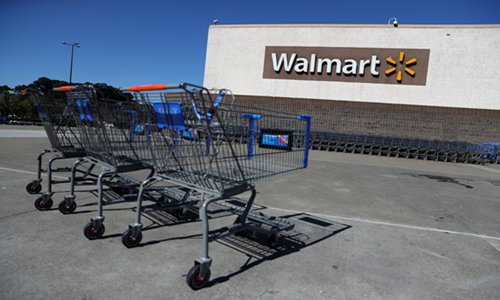HOME >> BUSINESS
Foreign retailers race for piece of China’s expanding spending pie
By Zhang Hongpei Source:Global Times Published: 2019/11/28 20:53:44

A view of a Walmart store on August 15 in Richmond, California Photo: VCG
More foreign-funded retailers are accelerating their expansion in the Chinese market, which has posted robust growth in recent years as the country is continuously upgrading its consumption structure, officials and industry analysts said on Thursday.
"Overall, foreign retailers are opening more branches in the China this year, featuring more new brands, flagship stores and new business models," Gao Feng, spokesperson for China's Commerce Ministry, told a regular briefing on Thursday.
Apart from US-based retail giant Walmart, more transnational companies are increasing their investment in China, said Gao.
Walmart announced last week that it plans to open 500 new stores in China over the next five to seven years, more than doubling its footprint in China.
It also said it will upgrade more than 200 stores in China over the next three years, adding high-technology features such as an all-channel digital experience for consumers who can pay via facial recognition.
The announcement followed the release of the company's third-quarter earnings, which showed that its sales grew 6.3 percent year-on-year, much higher than its 2.5 percent growth worldwide, the best results for Walmart China in the past five years with its Sam's Club as the main contributor.
Another US retail player Costco opened its first physical store in Shanghai in August, with the opening day causing a shopping craze.
German fresh fruit and vegetable discount retailer Aldi entered the Chinese market in June, opening two stores in Shanghai, which also drew crowds.
Such moves indicate that the commercial retail sector in China is open and also grows very fast, according to Gao.
Zhang Yi, CEO of Shenzhen-based iiMedia Research, told the Global Times Thursday that China's retail industry is flourishing. "The growth trend is optimistic and inviting, especially for foreign companies."
China's retail sales increased 8.1 percent year-on-year in the January-October period to 33.48 trillion yuan ($4.8 trillion)., data from the National Bureau of Statistics showed.
Excluding sales of automobiles, the growth rate reached 9 percent.
However, for some other foreign players, it might be a different story as they are abandoning the Chinese market due to intensifying competition and challenges.
In October, German wholesaler Metro decided to sell a majority stake in its Chinese operations to Beijing-based Wumei Technology Group. Metro said it would sell about 80 percent of its stake in the Chinese operations and retain a 20 percent stake, according to media reports.
Earlier this year, French supermarket Carrefour agreed to sell an 80 percent stake in its China unit to Suning International Group Co, a unit of Chinese retailer giant suning.com, for 4.8 billion yuan.
The transaction is expected to be completed by the end of the year as Carrefour China, which operates 210 hypermarkets and 24 convenience stores, has seen a sharp decline in sales.
"Those international brands entered the Chinese market years ago but they have experienced struggles after failing to update their strategies in a fast-changing and increasingly competitive market," said Zhang.
They need to do more homework to understand Chinese consumers by innovation, when it comes to high-technology applications or new business models, he noted.
"We will continue to create an international business climate with a market orientation and rule of law, helping various retailers grow in the Chinese retail sector," said Gao.
Posted in: INDUSTRIES,MARKETS